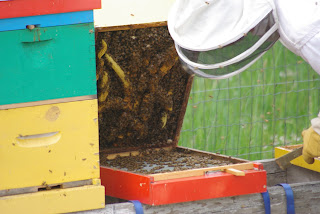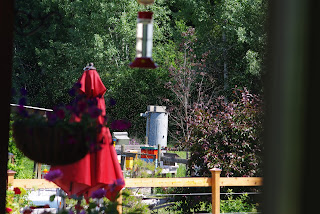 |
| Our FlowHive, ready to go. |
This blog was going to be about setting up our hives in our
second bee yard, or about the new boxes we created that will house three nucs
in one, or we were going to talk about setting up, yes, the new Flow Hive that
comes complete with honey tap on it... but apparently our bees had different
plans for us.
 |
| There are a LOT of bees and honey in that hive! |
First, we should say that all the hives are doing well. The
new queens we added seem to be very happy and very busy. We are watching new
orientation flights happening outside the hives daily. The bees are producing
honey, and our raspberry patch is absolutely abuzz as they work there, drawing
pollen. They were doing so well, producing so much honey and so many news bees
that...
 |
| Queen cells. |
Yes, today the Mellow Yellows were feeling less mellow, and
decided that, after three days of rain, they would take advantage of the
sunshine – they swarmed. For those of you not familiar with bees, in the
spring, when the hive gets busy and strong, healthy queens start to produce a
maximum output to keep up with the demands of the honey production, the hive
will get too crowded. When that happens, those pesky nurse bees will pick out
some of the best newly laid larvae and will start to pack those cells with lots
of royal jelly, making the baby bee grow into a potential queen. These are
relatively easy to spot on the frames because they are very long cells.
 |
| Mellow Yellow hive... very very full! |
The idea they have is that if they make enough of these
cells, the one that is the strongest will hatch first, kill the other wanna-be
queens while they are still in their cells, then go on the hunt for the
reigning queen. No hive wants two queens, but it is thought that the reigning
queen knows what is happening, is aware of the new queens being produced, and
starts to work gathering her loyal workers so that they will leave together to
start a new colony. In this way, she leaves a legacy – another hive. She has
opportunity to kill the forming queen cells, but she won’t. Isn’t nature
amazing?
 |
| The swarm starts! All those little yellow dots? Bees! |
When we looked out the window late this morning, and saw a
cloud of bees hovering over the bee yard, we knew exactly what was happening!
It was exciting to see how they started and what they did (after reading about
swarms and having a swarm land here several years ago), but it was infuriating
and a bit disheartening to know that all those bees, and the value therein,
were leaving. Fortunately we were able to watch where they went, and once they
started to gather and beard around the queen, we were able to shake the tree
branch they were on, and get the bees into a bucket then into a new hive. It
took several trips, but we ended up with most of them tucked away. We’re not
sure we’re out of the woods on this one yet, but tonight the hive was active,
so we slipped in a frame of larvae for the bees to tend to. It will help to
keep the bees in there, because they will not abandon uncapped larva, but is
also a bit of insurance in the event the queen was injured, stressed or killed
in the move (damn, those birds and their appetites), because the hive can now
use those larvae to create more queen cells.
 |
| The swarm rises higher and starts to move. |
On examination of our other hives, we found more ‘swarm
cells’ – new queens in the making – in the Mellow Yellow hive. The new queen
hadn’t yet gotten around to killing them, so we pulled those frames, added some
other frames (with honey and pollen) from other hives, and set them up as nucs.
In a week or so, we will know if this worked as well.
 |
| The swarm gathers on a branch about 14' in the air. |
So, to recap, we will write about the other bee yard and the
Flow Hive later (we promise) but today we got to see a swarm actually happen,
got to capture (recapture?) a swarm, and may have come out three hives ahead.
It was, all in all, a memorable day in our beekeeping world.
 |
| The new hive. The bees are flapping their wings, signalling to other hivemates, letting them know where their new home is. (at least, we hope they are right about this!) |
No comments:
Post a Comment